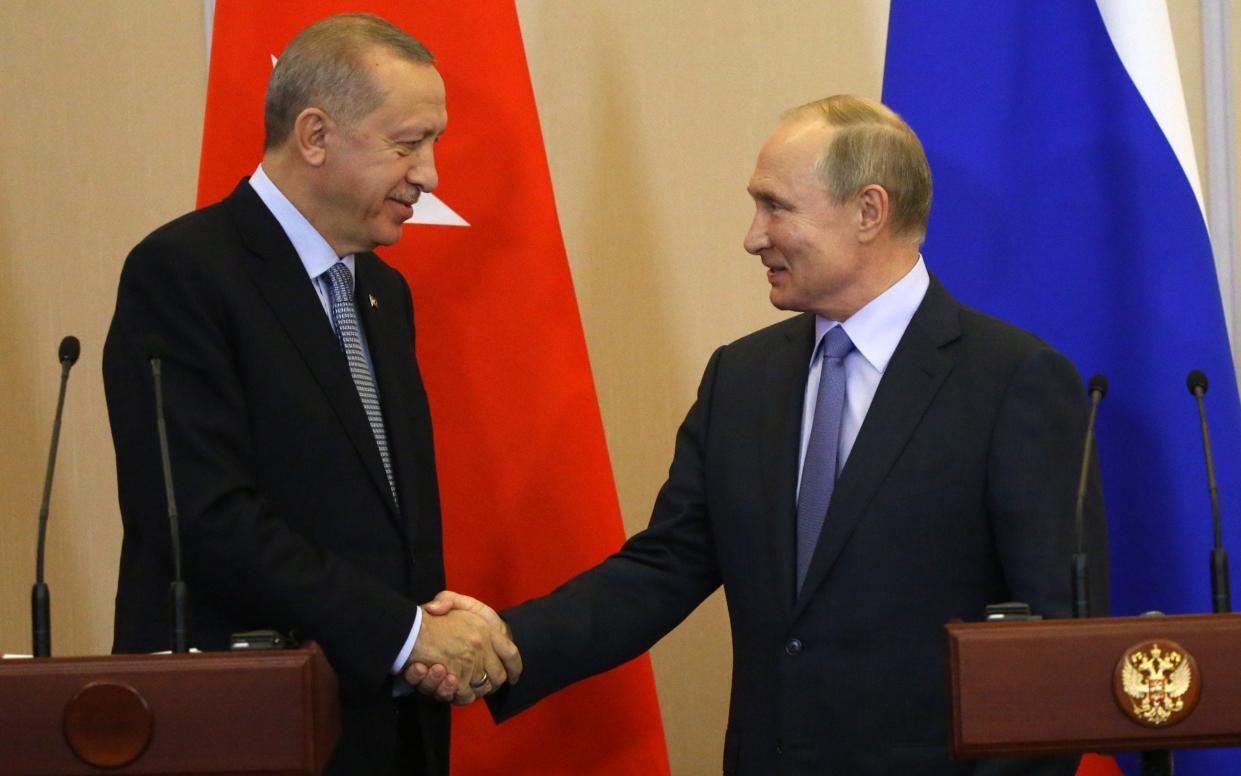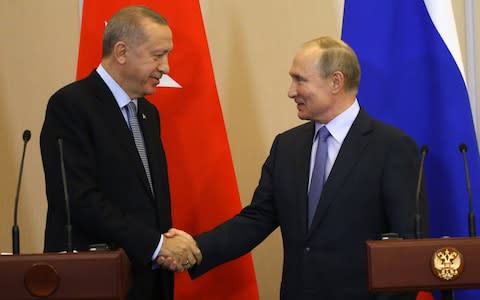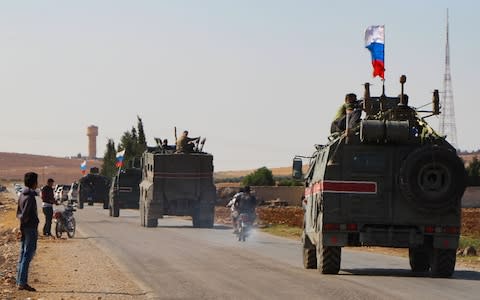Trump claims he saved lives of 'thousands' in Syria as he declares end of US involvement in the war

President Donald Trump has claimed the US had saved the lives of “thousands” in Syria and took credit for the ceasefire, in a bombastic speech declaring the end of American involvement in the war.
“This is an outcome created by us, the United States, and nobody else,” he said, addressing reporters at the White House a day after Turkey and Russia brokered a deal for Kurdish-held north-east Syria without the US president.
Mr Trump green-lit a Turkish-led offensive along the Syrian border two weeks ago, effectively abandoning Kurdish partners who had helped to defeat Islamic State.
International condemnation followed as hundreds of thousands of civilians fled the fighting and more than 80 Syrian civilians were killed.
#Russian military vehicles entering the city of #Kobani on the border with #Turkey. #VOApic.twitter.com/6was7YmHaK
— Sirwan Kajjo (@SirwanKajjo) October 23, 2019
Mr Trump imposed sanctions on Ankara in response to its offensive moves, but announced in his speech that these would be lifted if the ceasefire held.
"We’ve avoided another costly military intervention, many thousands of people could have been killed,” he said, flanked by Mike Pence, Vice President, and Mike Pompeo, Secretary of State.
“Turkey, Syria and all forms of the Kurds have been fighting for centuries. We have done them a great service, a great job for all of them,” he said, declaring the US was done fighting others’ wars. “We’re getting out. Let’s someone else fight over this long bloodstained sand.”
He promised in the future to only deploy American troops into battle when the US’s national interests are at stake, and only when there was a plan to win. “We will only win,” he said.
His claims of success bore little resemblance to the reality on the ground, however, and were likely intended for his base at home to whom he had promised an end to "endless wars".
The US president’s announcement came a day after a deal was struck between Turkish President Recep Tayyip Erdogan and Russian President Vladimir Putin to "facilitate the removal" from the border region of Kurdish People's Protection Units (YPG) fighters.

The agreement will also see Turkey preserve a so-called "safe zone" inside Syria about 75 miles long and 20 miles deep.
Turkey’s defense ministry said that the withdrawal from the buffer zone would mean that there was “no further need to conduct a new operation,” preventing a feared humanitarian catastrophe.
The deal effectively redraws the map of northern Syria and ends nearly six years of autonomy carved out by the local Kurdish administration.
Russian and allied Syrian government forces began patrolling for the first time yesterday in towns US forces were once stationed.
Humvees bearing Russian flags were filmed driving into Kobane, marking the first pro-regime presence in the area in more than seven years.
The talks, which took place in Mr Putin’s dacha in the Black Sea resort of Sochi, confirmed Moscow’s position as powerbroker in Syria.

"The United States has been the Kurds' closest ally in recent years. (But) in the end, it abandoned the Kurds and, in essence, betrayed them," Dmitri Peskov, a Kremlin spokesman, said pointedly on Wednesday. "Now they (the Americans) prefer to leave the Kurds at the border (with Turkey) and almost force them to fight the Turks."
Or as Mevlut Cavusoglu, the Turkish foreign minister, put it: “When you are present on the ground, then you are also present on the negotiating table."
The US, which did not have a seat at the table for Tuesday’s talks, has been shut out of decision-making and left with little leverage to demand assurances for its former Kurdish partners.
Mark Esper, US secretary of defence, meanwhile, was in Baghdad on Wednesday meeting with Iraqi prime minister Adel Abdul Mahdi to manage the fallout of their quick retreat.
The US withdrew the bulk of its some 1,000 troops from Syria on Monday, greeted on the way out by Kurdish residents throwing rotten fruit and holding up signs reading: “We will not forget this betrayal”.
The Pentagon had announced the troops were expected to move to western Iraq to continue the campaign against Islamic State and "to help defend Iraq".
But it appeared the move was not first approved by Baghdad, which issued a statement saying they did not have the right to remain in the country.
Mr Esper was told he had 30 days to remove the troops.

